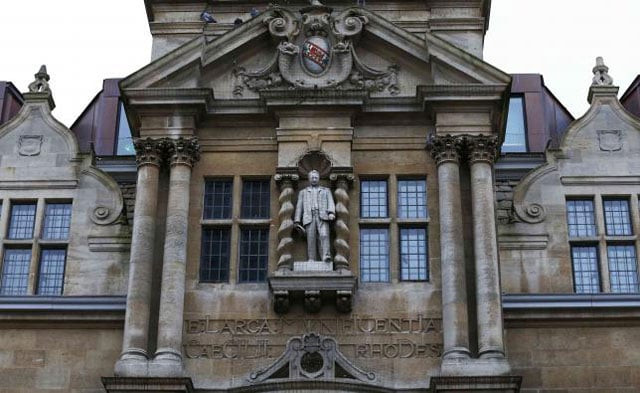Oxford keeps statue of colonialist Rhodes, angering some students
'Rhodes Must Fall in Oxford' campaign has sparked a heated debate about how Britain remembers its imperialist past

PHOTO: Reuters
Inspired by protests at the University of Cape Town in South Africa, which led to its statue of Rhodes being removed last April, the "Rhodes Must Fall in Oxford" campaign has sparked a heated debate about how Britain remembers its imperialist past.
Oxford University granted record EU loan to renovate ancient buildings
Rhodes, a fervent imperialist and mining magnate, was a central figure in Britain's colonial project in southern Africa, giving his name to Rhodesia, present-day Zimbabwe, and founding the De Beers diamond empire.
Oriel College, one of 38 that make up Oxford University, said the statue would remain in place in a niche on the facade of a building partly funded by a donation from Rhodes. It said it would add an explanation of the historical context.
"The recent debate has underlined that the continuing presence of these historical artefacts is an important reminder of the complexity of history and of the legacies of colonialism still felt today," Oriel said in a statement.
"By adding context, we can help draw attention to this history, do justice to the complexity of the debate and be true to our educational mission."
The 'Rhodes Must Fall in Oxford' campaigners said on Facebook they would redouble their efforts to secure the removal of the statue and a separate plaque bearing a political tribute to Rhodes.
They labelled Oriel's statement "outrageous, dishonest and cynical" because it indicated that the plaque would also remain in place, even though the college had described it as "inconsistent with our principles" in a statement in December.
Forward thinking: 400 teachers come together to improve standard of education
A student at Oriel in his youth, Rhodes left the college money when he died and also endowed the Rhodes Scholarships, which have allowed 8,000 students from countries around the world to study at Oxford over the past century.
The student campaigners say it is wrong to honour a man who made his fortune from the exploitation of African miners, secured power through bloody imperial wars, and paved the way to apartheid with his beliefs and measures on racial segregation.
The debate over Rhodes has made front-page headlines in Britain and attracted comment from far and wide, including from former Australian prime minister Tony Abbott, a onetime Rhodes scholar, who supported keeping the statue.



















COMMENTS
Comments are moderated and generally will be posted if they are on-topic and not abusive.
For more information, please see our Comments FAQ